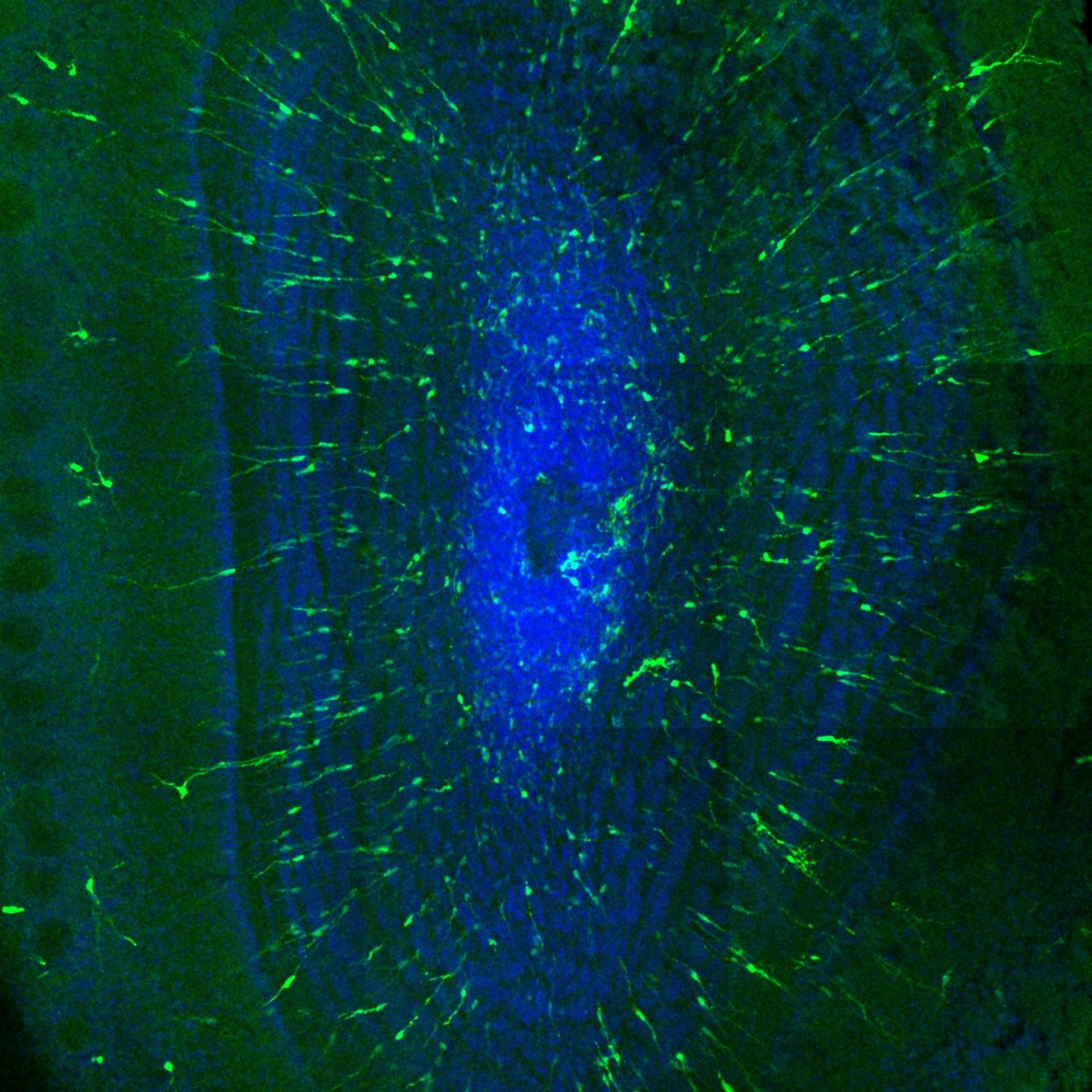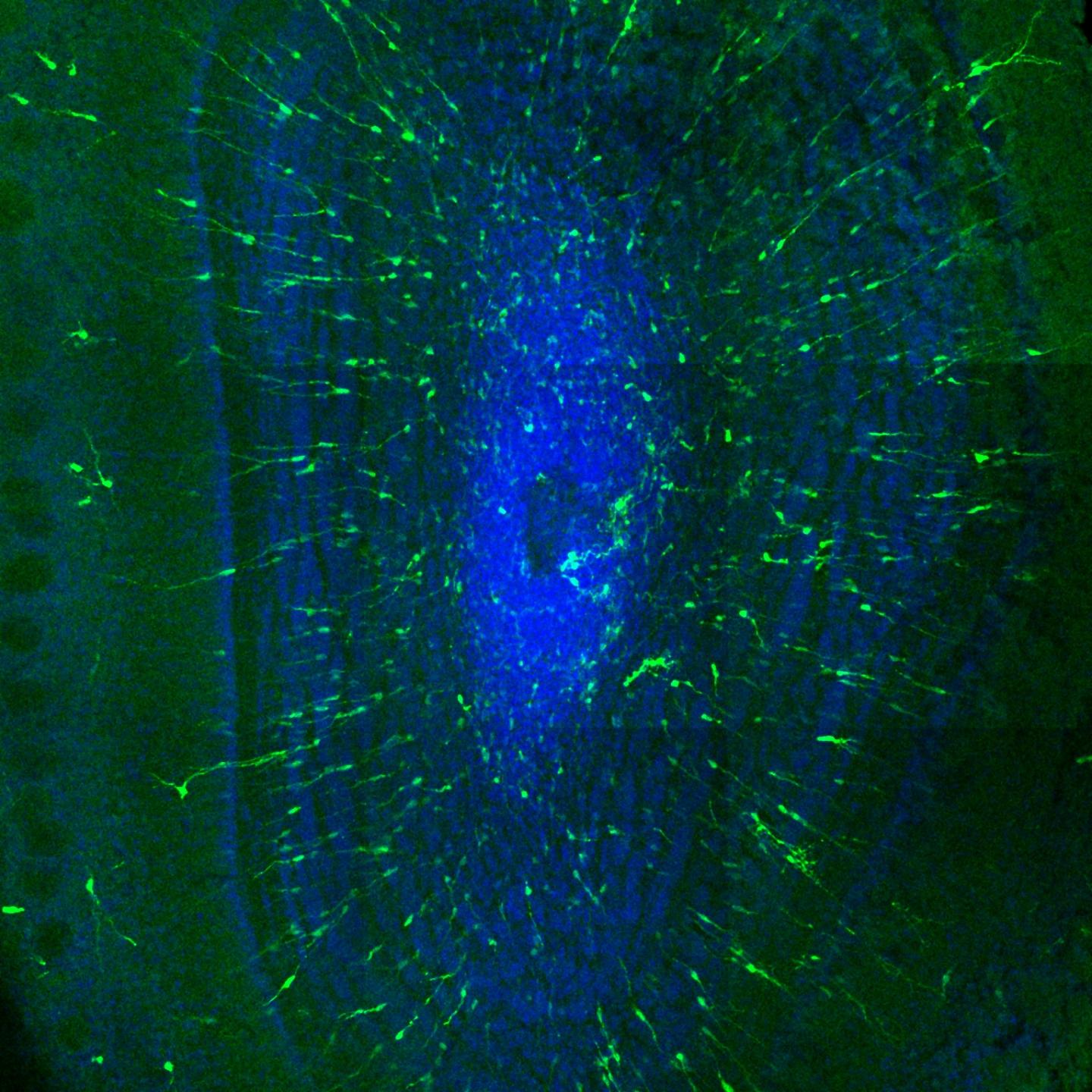
Credit: Francis Szele
New research has shown how an unusual gene is needed for brain development in young mice.
Since the human genome was first sequenced in 2001, scientists have puzzled over swathes of our DNA that despite apparently lacking function are made into ribonucleic acid (RNA) by the cell. Why make RNA at all when it is not then used to make proteins, which perform fundamental biological tasks? Perhaps these so-called non-coding RNAs perform critical, but as yet unknown, tasks?
Scientists from the Universities of Bath, Oxford and Edinburgh have now identified one such non-coding RNA, called Paupar, which influences how healthy brains develop during early life. They have shown that Paupar orchestrates proteins that control neurodevelopment.
They studied KAP1, a gene that codes for an essential protein associated with several fundamental processes in neurodevelopment. The KAP1 protein acts as a regulator for several other genes which allow the brain to grow healthily and develop several types of brain cell.
Using molecular biology techniques they discovered that Paupar can act as a switch, modulating how KAP1 acts by binding to it- thus influencing the development of healthy brains in mice. It is the first time that a non-coding RNA has been shown to bind to KAP1.
The research is published in The EMBO Journal.
Dr Keith Vance, from the University of Bath Department of Biology & Biochemistry led the research. He said: "It is now clear that the genome expresses many non-coding RNAs that are not made into protein. Despite this, there is a lot of controversy regarding their function. Some groups argue that these non-coding RNAs are a result of transcriptional noise with no apparent use whilst others think that the vast majority of them must be doing something important.
"We have shown here good evidence that one of these genes, called Paupar, is important for development of the brain.
"It's a young field, but I think it's clear we have to reassess the central dogma of molecular biology that DNA is transcribed to RNA that codes for a protein. We're now seeing that some RNAs can go off and do something themselves.
"Our findings also help us understand the essential role of KAP1, which is something we're really interested in as we look at the development of the central nervous system."
###
This research was funded by the Biotechnology and Biological Sciences Research Council (BBSRC) and the Medical Research Council (MRC).
For further information, please contact Chris Melvin in the University of Bath Press Office on +44 (0)1225 383941 or +44 (0)7976 828268 or [email protected].
Notes
Animal research at Bath
The University of Bath has signed the Concordat on Openness on Animal Research. The University is committed to enhancing our communications with the media and public about our research using animals. Find out more: http://www.bath.ac.uk/collections/animal-research/
University of Bath
The University of Bath is one of the UK's leading universities both in terms of research and our reputation for excellence in teaching, learning and graduate prospects.
The University is rated Gold in the Teaching Excellence Framework (TEF), the Government's assessment of teaching quality in universities, meaning its teaching is of the highest quality in the UK.
In the Research Excellence Framework (REF) 2014 research assessment 87 per cent of our research was defined as 'world-leading' or 'internationally excellent'. From developing fuel efficient cars of the future, to identifying infectious diseases more quickly, or working to improve the lives of female farmers in West Africa, research from Bath is making a difference around the world. Find out more: http://www.bath.ac.uk/research/
Well established as a nurturing environment for enterprising minds, Bath is ranked highly in all national league tables. We are ranked 5th in the UK by The Guardian University Guide 2018 and 6th for graduate employment. According to the Times Higher Education Student Experience Survey 2017, we are in the top 5 universities students would recommend to a friend. Bath has also been named Sports University of the Year 2018 by The Times and Sunday Times.
Media Contact
Chris Melvin
[email protected]
44-012-253-83841
@uniofbath
http://www.bath.ac.uk
Original Source
http://bath.ac.uk/announcements/enigmatic-gene-critical-for-a-healthy-brain-show-university-of-bath-scientists/ http://dx.doi.org/10.15252/embj.201798219





